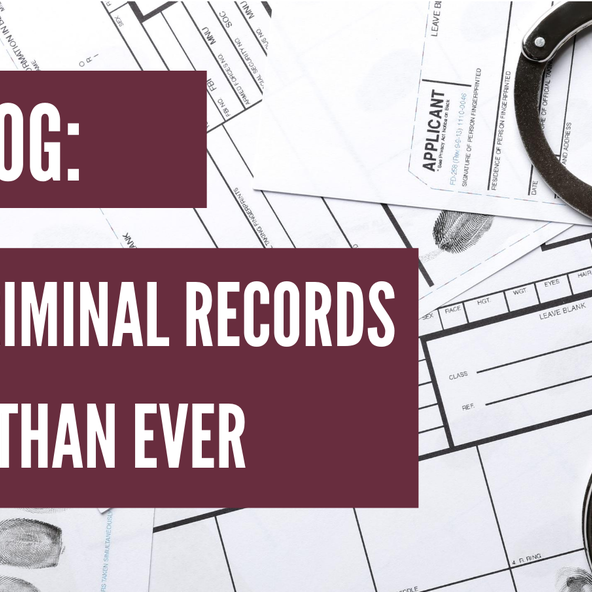
At long last, our society has begun to reckon with the devastation that over-policing has wrought, particularly on communities of color. Many District residents have known for years that one of the costs of a police encounter can be a life-changing criminal record. Once burdened with a criminal record, individuals encounter obstacles to getting employment, housing, public assistance, and education. Sealing those records, therefore, can be invaluable. Unfortunately, even before the public health emergency, D.C. had one of the most restrictive record-sealing processes in the country. Now is the time to make criminal record sealing easier; but, in D.C., it is only getting harder.
Once a judge has ordered the sealing of a criminal record, it is harder for employers, landlords, and schools to use those records to discriminate. Criminal record sealing means one less obstacle to overcome in the search for a job, for a home, or for an education. In particular, people of color—who already have to contend with both overt and systemic racism—face even higher hurdles when they face compounding discrimination based on a criminal record.
The judicial process of sealing a criminal record takes several months. Before an individual with a D.C. criminal record can even ask a judge to seal that record, the individual must contend with a baroque system of laws, which can seem impenetrable to a person without an attorney. In most cases, the individual with the record will need to inform the Court of every other criminal case they may have because eligibility for sealing a record depends in part on what offenses, if any, came before and after it. The individual will then need to either explain in a motion to the Court why they are entitled to sealing of every single case, or they will waive their right to seal any records that they are not trying to seal in that particular motion. If the individual fails to follow any of the required steps, the Court may deny their motion for sealing.
So, before filing a motion, a person must obtain their complete criminal history from both the Court and the Metropolitan Police Department (MPD) so that they have a full list of cases to include in their motion. Although it might seem like gathering these documents should be a straightforward enterprise, MPD has a needlessly burdensome and time-consuming procedure that has only been exacerbated by COVID-19.
Thankfully, the Court has a process that permits individuals to obtain records in a multitude of ways—in-person, online, by email, or by mail. Since the Clerk’s office has operated entirely remotely during the public health emergency, records may not be obtained in-person. However, individuals may rely upon one of the other methods to obtain necessary court records.
By contrast, though, MPD has always had a more complicated process, one that is made even more difficult by COVID-19. There are only two ways for a person to get their records from MPD: they can go to MPD headquarters in person or they can send a notarized letter to MPD requesting the records. Going to MPD headquarters in person can be a particularly scary experience for someone who previously had a traumatic or even violent encounter with a police officer. Getting a letter notarized can be difficult and expensive.
Since the public health emergency began, securing MPD documents required to seal criminal records has gotten even more challenging. MPD has made no efforts to adapt to the new remote environment that so many public and private institutions have embraced; instead, it still requires individuals to either come to the headquarters in person or—depending on who you ask—to submit a notarized letter to get their records. Many individuals, especially those at increased risk from COVID-19, understandably do not feel safe going in person to MPD headquarters, particularly because getting there often means inadvisable travel on public transportation. Even if individuals opt to mail a notarized letter requesting their records, this requires an in-person trip to a notary. (D.C. passed a law in May allowing for remote notarization, but to date, it has not set up an approved process for notaries to do this.) And, to make matters worse, MPD has advised some (but not all) callers that it will not accept mail-in requests for records, even if notarized, causing confusion as to its actual practice.
Unfortunately, even those individuals who go in person to MPD headquarters—despite the substantial risks of doing so—are often times being turned away. MPD, without having publicly announced a change in policy, currently is requiring people to make appointments before they can get their records. One Legal Aid client went in person to MPD headquarters to request her records, but she was sent home and told she could only get her records if she makes an appointment to do so. Our client was not even permitted to submit a records request form since she was already there.
Legal Aid appreciates MPD’s efforts to protect individuals’ records by only releasing those records to the appropriate individual. We further understand MPD’s concerns about having members of the public enter their headquarters without an appointment during the public health emergency. But the barriers it has set up simply make it too difficult for individuals to obtain their own records.
The police department could make it easier for individuals to get their records by taking two easy steps:
1. The police department should eliminate the notarization requirement. In its place, MPD should accept signed declarations just as the courts and other D.C. agencies do. This would allow individuals to obtain their records without incurring unnecessary costs and going through the additional steps of finding a notary. Especially during the public health emergency, meeting with a notary is potentially unsafe and inconsistent with public health advisories to social distance and limit face-to-face contacts.
2. The police department should create an online application—including a declaration that individuals can e-sign—which individuals can submit to request their police records without going in person to MPD headquarters. An online application will make it easier for individuals with internet access to request their records. The police department should continue to accept mailed and in-person requests as well because not all individuals seeking record sealing have internet access. However, an online application will expand individuals’ ability to seek record sealing.
As our nation reckons with the realities that communities of color are living disproportionately with the acute effects of COVID-19 and the long-term effects of racism and over-policing, now is the time to reduce—not increase—barriers to criminal record sealing.




